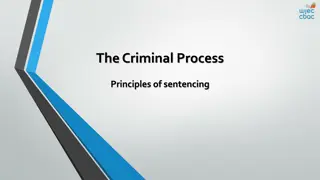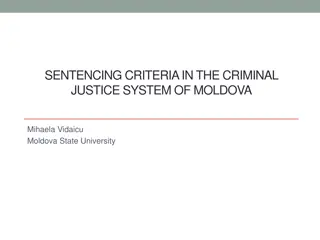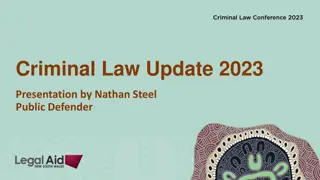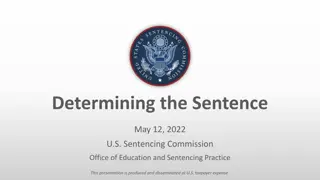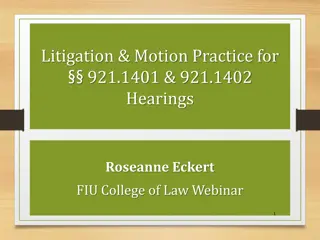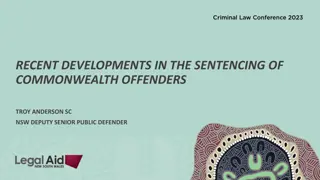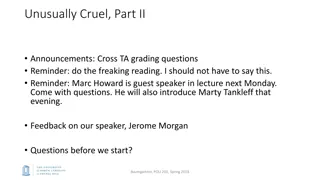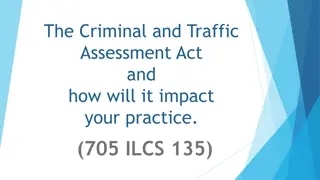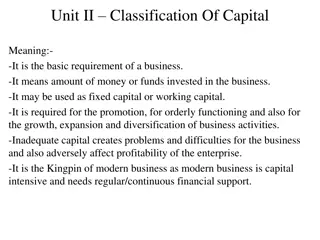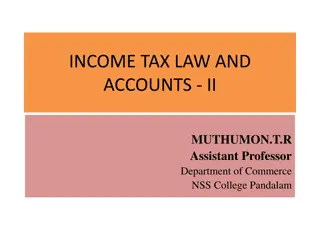Examining Legal Issues in Capital Sentencing
This content discusses aggravating and mitigating circumstances in criminal acts, along with cases like Ring v. Arizona and Hurst v. Florida, focusing on the Sixth Amendment rights and the role of the jury in determining death penalty sentencing. The cases highlight the importance of jury findings and the potential violations of constitutional rights in capital sentencing schemes.
Download Presentation

Please find below an Image/Link to download the presentation.
The content on the website is provided AS IS for your information and personal use only. It may not be sold, licensed, or shared on other websites without obtaining consent from the author. Download presentation by click this link. If you encounter any issues during the download, it is possible that the publisher has removed the file from their server.
E N D
Presentation Transcript
SOMETIMES THE TRUTH HURST By: Marilyn Ampel
Definitions Aggravating Circumstances: Factors that increases the severity or culpability of a criminal act, including, but not limited to, heinousness of the crime, lack of remorse, and prior conviction of another crime. Recognition of particular aggravating circumstances varies by jurisdiction. Example: The age of Perry s child was 3 months old, therefore, unable to defend himself in any way. Mitigating Circumstances: Factors that lessen the severity or culpability of a criminal act, including, but not limited to, defendant's age or extreme mental or emotional disturbance at the time the crime was committed, mental retardation, and lack of a prior criminal record. Recognition of particular mitigating circumstances varies by jurisdiction. Example: Perry called 911 and confessed killing his son to the police, as well as showing what he had done to his son on a doll. Florida Statute 782.04(1)(a): Sometimes the guilt verdict can establish an aggravating circumstance, though. If the verdict goes beyond just saying guilty under 782.04(1)(a) and instead specifies robbery felony-murder, 782.04(1)(a)2.d., that would establish the aggravating circumstance in 921.141(5)(d).
Ring v. Arizona Timothy Ring was on trial for murder, and the jury found him guilty of felony murder during an armed robbery. Based on Arizona law, Ring could not be sentenced to death unless the judge found at least one aggravating factor and no mitigating circumstance in a separate sentencing hearing. In the judges separate hearing, they weighed the aggravating and mitigating circumstances and sentenced Ring to death. The court overturned a portion of Walton v. Arizona and upheld Apprendi v. New Jersey; since Arizona allowed a sentencing judge, without a jury, to find aggravating circumstances for imposition of the death penalty. The defendant may not be exposed to the penalty exceeding the maximum he would have received if punished according to the facts reflected in the jury verdict alone. Both Ring and Apprendi are classified as procedural as opposed to substantive.
Hurst v. Florida Timothy Lee Hurst was charged and convicted of the robbery and first-degree murder of his coworker Cynthia Harrison. Hurst was granted a new sentencing trial due to his counsels lack of investigating and presenting evidence of Hurst s borderline intelligence and organic brain damage. Hurst was only allowed to present mental retardation evidence as a mitigating factor, not a defense, and was still sentenced to death in a 7-5 vote by the jury. In an 8-1 decision by the Supreme Court, they ruled that a jury, not a judge, must find all aggravating factors necessary to impose the death penalty. While Florida still required the jury to recommend the death sentence, the judge was only required to take it into consideration when sentencing the defendant.
Legal Issue The legal issue in Ring was, Does Arizona's capital sentencing scheme violate the Sixth Amendment's jury trial guarantee by entrusting to a judge the finding of facts sufficient to impose the death penalty? Yes, the jury must be the sole fact finder of aggravating factors. Did Florida s sentencing scheme violate the sixth amendment in light of Ring v. Arizona? Yes, it violates a person s sixth amendment rights by limiting the jury to an advisory role. The jury needs to be the sole fact finding authority in capital sentencing by weighing the aggravating and mitigating circumstances. The outcome of this case gave much more power to the juries as opposed to judges to determine whether a defendant should be executed.
Floridas Statute Changes A. B. Florida abolished the practice to allow death sentences by judicial override. Florida s senate has established changes to their capital sentencing scheme. a) The prosecuting attorney must submit notice that they are seeking the death penalty and of the aggravating circumstances they intend to prove. b) The jury must find all of the aggravating factors to exist c) The jury must determine whether aggravating factors outweigh the mitigating circumstances. d) A vote of 10/12 is sufficient to sentence the defendant to death. e) The judge may impose a life sentence without parole when the jury recommends death. f) The judge may no longer override the jury s recommendation of life imprisonment by imposing the death penalty.
State of Florida v. Perry Currently on the docket for the Florida Supreme Court. http://caselaw.findlaw.com/fl- district-court-of-appeal/1729492.html This case will ultimately decide how Florida will interpret their sentencing scheme, based on the changes made to the State s statute. Larry Darnell Perry is accused of murdering his 3 month old son in 2013. He claims that he tried to begin by soothing the child and resorted to slamming him against the wall and ultimately twisting his neck to get the child to stop crying. He knew what he did was wrong and told the dispatcher that he, deserved whatever. The defense council is trying to get the law established in Hurst to apply to this case and further affirm how it will be carried out.
Delaware's Adjustments Delaware s Supreme Court struck down its own death penalty statutes in light of the Hurst decision. They found that statute violates the Sixth Amendment to a persons right to a trial by jury. In the case of Rauf v. State of Delaware, the state revised and accepted five questions to the Delaware Constitution in reference to the decision in Hurst. All of the new adjustments expanded upon the legality of the sixth amendment and the right to interpret aggravating circumstances being left to the jury.
Alabamas Inability to Adapt In Alito s dissent, he believed that this case wouldn t change any precedent in other states. The court has ordered Alabama to have several of its cases reviewed by the Alabama appellate courts. The Alabama Supreme Court made a ruling that their statute is still valid. Therefore, it is legal for an Alabama judge to override a jury s verdict of a life sentence. Alabama s Code Title 13: Criminal Code, Chapter 5: the judge can override the juries recommendation of a life imprisonment sentence.
Judicial Overrides Alabama Only jurisdiction where the judge routinely overrides jury verdicts of life to impose capital punishment. Florida and Delaware Currently, no one in Delaware is on death row due to judicial override. Judicial override is often used to overrule a jury death verdict and impose life. Since 1976, 112 jury verdicts have been overridden. 91% of the overrides have overruled jury verdicts of life to impose the death penalty with equates to 101 people. Since 1999, there have not been any death sentences due to override in Florida.
In summation, the decision in Hurst v Florida caused both Delaware and Florida to reevaluate their sentencing schemes, while Alabama remains the only state which allows for judicial override.
Works Cited Ring v. Arizona. (n.d.). Oyez. Retrieved October 11, 2016, from https://www.oyez.org/cases/2001/01-488 Hurst v. Florida. (n.d.). Oyez. Retrieved October 11, 2016, from https://www.oyez.org/cases/2015/14-7505 Alabama Supreme Court tp://Rules Death Penalty Statute is Still Valid. (2016, September 30). Retrieved October 11, 2016, from http://eji.org/news/alabama- supreme-court-rules-death-penalty-statute-still-valid FindLaw's District Court of Appeal of Florida case and opinions. (2016, March 16). Retrieved October 9, 2016, from http://caselaw.findlaw.com/fl-district-court-of- appeal/1729492.html
Works Cited Aggravating Circumstances. (n.d.). Retrieved October 11, 2016, from https://www.law.cornell.edu/wex/aggravating_circumstances Mitigating Circumstances. (n.d.). Retrieved October 11, 2016, from https://www.law.cornell.edu/wex/mitigating_circumstances Prosecutors Pursue Death Penalty for Larry Darness Perry in 2013 FL Murder of His Infant Son. (2014, January 13). Retrieved October 4, 2016, from http://www.cncpunishment.com/forums/showthread.php?9820-Prosecutors- Pursue-Death-Penalty-for-Larry-Darnell-Perry-in-2013-FL-Murder-of-His-Infant-Son


